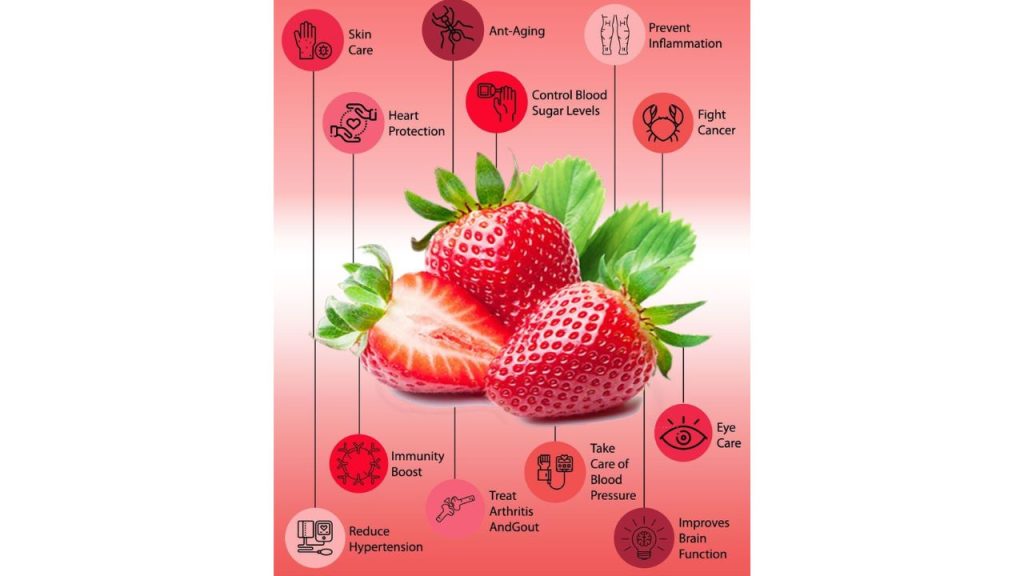Health Benefits of Strawberries the Best Superfood Snack
Strawberries, with their bright red color, juicy texture, and sweet-tangy flavor, are much more than just a delicious treat. They are often referred to as a “superfood,” thanks to their impressive nutritional profile and health benefits. Packed with vitamins, minerals, antioxidants, and fiber, strawberries make an excellent snack choice for those looking to improve their overall health and well-being. Here’s an in-depth look at why strawberries deserve a prominent place in your diet.
Nutritional Powerhouse
Strawberries are low in calories but high in nutrients. A one-cup serving (about 150 grams) contains approximately:
Calories: 50
Vitamin C: 149% of the daily recommended intake
Manganese: 29% of the daily recommended intake
Folate: 9% of the daily recommended intake
Potassium: 6% of the daily recommended intake
Fiber: 3 grams
Additionally, strawberries contain small amounts of iron, magnesium, phosphorus, and vitamins B6, K, and E. This nutrient density makes strawberries an ideal snack for health-conscious individuals.

Rich Source of Antioxidants
Strawberries are loaded with antioxidants, which are compounds that protect your cells from damage caused by free radicals.
Key antioxidants in strawberries include:
Anthocyanins: Responsible for their vibrant red color, anthocyanins help reduce inflammation and protect against chronic diseases such as heart disease.
Ellagic Acid: A natural antioxidant that has been shown to reduce the risk of certain cancers and improve skin health.
Quercetin: Known for its anti-inflammatory and anti-carcinogenic properties.
Regular consumption of antioxidant-rich foods like strawberries can help combat oxidative stress and support overall health. Click here
Boosts Heart Health
Heart disease remains the leading cause of death worldwide, but strawberries can play a role in reducing the risk.
Here’s how:
Lowers Cholesterol: Strawberries contain pectin, a type of soluble fiber that helps lower LDL (bad) cholesterol levels.
Improves Blood Pressure: Potassium in strawberries helps regulate blood pressure by counteracting the effects of sodium.
Enhances Vascular Function: The anthocyanins in strawberries improve the elasticity of blood vessels, reducing the risk of hypertension and stroke.
Studies have shown that consuming strawberries regularly can lead to a significant reduction in heart disease risk factors.
Supports Immune Function
Strawberries are one of the richest natural sources of vitamin C, a nutrient critical for immune health. Vitamin C stimulates the production of white blood cells, which help fight infections and illnesses. It also acts as a powerful antioxidant, protecting immune cells from damage caused by free radicals. Adding strawberries to your diet during cold and flu season can give your immune system the boost it needs to stay strong.

Promotes Digestive Health
Fiber is an essential nutrient for maintaining a healthy digestive system, and strawberries provide a good amount of it.
The dietary fiber in strawberries helps:
Regulate Bowel Movements: Preventing constipation and promoting regularity.
Feed Gut Bacteria: Acting as a prebiotic to nourish beneficial gut bacteria, which support overall gut health and immune function.
Control Blood Sugar Levels: Slowing the absorption of sugar into the bloodstream, which can be especially beneficial for people with diabetes.
Aids in Weight Management
Strawberries are a perfect snack for those looking to lose or maintain weight. They are low in calories, naturally sweet, and high in water content, which helps you feel full without consuming too many calories. The fiber in strawberries also contributes to satiety, reducing the likelihood of overeating. Swap calorie-dense snacks for a bowl of fresh strawberries to satisfy your sweet cravings while staying on track with your weight goals.
Improves Skin Health
Strawberries are a natural ally for glowing skin. The high vitamin C content helps in the production of collagen, a protein that keeps skin firm and elastic. Additionally, the antioxidants in strawberries protect the skin from damage caused by UV rays and pollution, slowing down the aging process. The ellagic acid in strawberries has been shown to prevent collagen breakdown and reduce the formation of wrinkles.
Regulates Blood Sugar Levels
For people with diabetes or those at risk, strawberries can be a beneficial addition to the diet. Despite their sweetness, strawberries have a low glycemic index (GI) and do not cause significant spikes in blood sugar levels. The fiber content also helps slow the digestion and absorption of sugars, further aiding in blood sugar control. Research suggests that consuming strawberries may improve insulin sensitivity, reducing the risk of type 2 diabetes.
Supports Brain Health
As we age, cognitive decline becomes a concern for many. The antioxidants and phytochemicals in strawberries can help combat this by reducing inflammation and oxidative stress in the brain. Studies have shown that regular consumption of strawberries may improve memory, learning, and overall brain function. The anthocyanins in strawberries have been linked to a reduced risk of neurodegenerative diseases like Alzheimer’s.
Convenient and Versatile Snack
One of the best things about strawberries is their versatility. They can be enjoyed fresh, frozen, or dried, making them a convenient snack option for any time of the day.
Here are some ideas for incorporating strawberries into your diet:
Fresh: Enjoy them as they are for a quick and easy snack.
Smoothies: Blend strawberries with yogurt, banana, and a splash of milk for a refreshing drink.
Salads: Add sliced strawberries to green salads for a burst of sweetness.
Desserts: Use strawberries to top pancakes, waffles, or yogurt.
Dried: Carry dried strawberries as a portable snack for on-the-go energy.

Tips for Selecting and Storing Strawberries
To maximize the health benefits of strawberries, it’s important to select and store them properly:
Choose strawberries that are bright red, firm, and free of mold, opt for organic strawberries, when possible, to reduce exposure to pesticides. Store strawberries in the refrigerator and wash them just before eating to maintain freshness. Frozen strawberries are also a great option, as they retain most of their nutrients and can be stored for months. Click here
Conclusion
Strawberries are a true superfood, offering a wide range of health benefits in a delicious and convenient package. From boosting heart health and supporting immunity to improving skin and brain function, these vibrant berries are a nutritional powerhouse. Whether you enjoy them fresh, blended into a smoothie, or as a topping for your favorite dishes, incorporating strawberries into your diet is a simple and effective way to enhance your overall health. So, the next time you’re looking for a snack, reach for a bowl of strawberries and enjoy the sweet taste of wellness.

